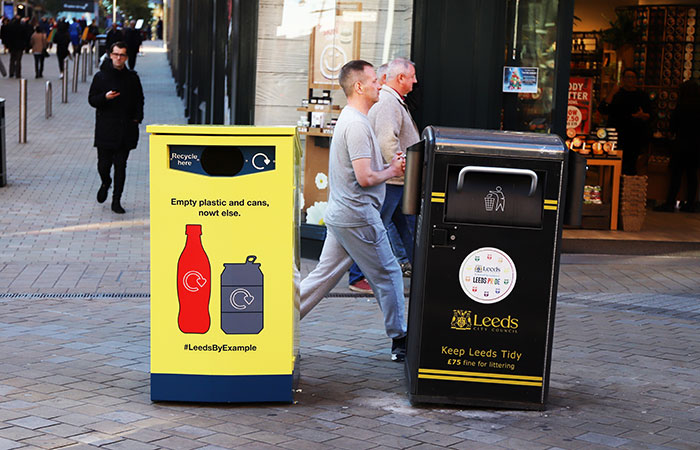#LeedsByExample, our new consumer-facing campaign to address recycling on-the-go, launched this month with unprecedented backing from major brands and industry associations. This is why.
There’s no getting away from the fact that we live in a fast-paced world. From messaging to music, shopping to shows, when it comes to instant access and quick consumption, our expectations are higher than they’ve ever been before.
In the context of food and drink, the same rules apply. The UK is increasingly reaching for quick-fix food that is consumed on the go. Research shows that the pre-prepared food and drinks business is one of the fastest growing in the UK’s foodservice industry. Its value has increased by £2.5 billion since mid-2015. Like it or not, on-the go eating is on the up, and so too is the amount of packaging waste this food generates.
Unlike food and drink consumed at home, on-the-go packaging is far more likely to end up in landfill. Why? There are two reasons. The first; a lack of suitable recycling bins in towns and cities. The second: confusion. This confusion stems from a lack of consumer understanding over what should be recycled and where it can go. Bin contamination is the outcome of confusion. We know that plastic bottles and aluminium cans are often mixed in with old sandwiches and teabags. We also know that waste packaging in contaminated bins is unrecyclable, being diverted to landfill or incineration.
An engaging campaign to provide solutions
When you consider that just under 25 billion single-use bottles, drinks and coffee cups are used in the UK every year – many of which are disposed of whilst out and about - you may appreciate the potential impact of this problem. We decided an engaging campaign that could provide solutions was required.
After a huge amount of hard work with our partner Hubbub and key stakeholders, last week it launched as a six-month pilot campaign that seeks to discover how to boost on-the-go recycling before openly sharing the results, so the whole of the UK can benefit.
"You may ask why a B2B focused compliance scheme like Ecosurety would want to lead a consumer-facing recycling campaign?
I firmly believe everyone needs to be included in the conversation on recycling. From one end of the supply chain - the producers, to the other - the consumers, we’ve all got to recognise our roles in this vitally important process."
Without consumers recycling, big producers can’t hit their recycling targets. Without infrastructure like bins, consumers can’t recycle. Building an understanding of how the UK’s recycling system works is fundamental to its success. Furthermore, the benefits will be felt by everyone.
Significantly increasing the availability of recycling material boosts supply and should reduce PRN prices and volatility. This reduces costs for producers, which is fed back down the production line to consumers. With better recycling everyone – including the environment – wins.
Not just the responsibility of the consumer
Aware that packaging waste isn’t just the responsibility of the consumer, together with Hubbub we have engaged with big producers from the very beginning. To date we have 24 major brands and associations on board, including Alupro, Asda, Morrisons, M&S, Co-op, OPRL, Costa, Starbucks and Coca-Cola.

Leeds City Council have also been a critical cog in the #LeedsByExample machine, helping us with our plans to improve the recycling bin network across the city centre. Together we’ve created a clear and coherent plan of action to tackle the lack of recycling infrastructure with manageable solutions and a simple set of messages for consumers that are instant and accessible. Close collaboration with the recycling companies who are collecting the waste will also enable us to monitor the exact success of the initiatives being trialed.
The resulting #LeedsByExample campaign is innovative, engaging and fun. From bins that belch and blow bubbles to recycle reward machines that provide discount vouchers in exchange for bottles and cans. From an innovative new app by OPRL that directs people to their closest recycling bin, to rubbish-filled shipping containers that provide a visual image of how much Leeds sends to landfill every three days. The #LeedsByExample campaign presents consumers with the hard facts on why recycling is important, but it also provides them with simple ways they can take action.
#LeedsByExample is a truly original, exciting campaign. Over the next six months we hope to gather key insights into what makes recycling on-the-go better and easier. Our findings will be widely available in the hope that other businesses and cities can further improve their own systems.
I look forward to sharing these results with you next year.

James Piper
Non-Executive Director
James Piper is a non-executive director of Ecosurety, having previously taken on the role of CEO for nearly five years when he was now focused on leading the development of new products and services that not only benefited producers, but helped to drive change for good and a positive impact on UK recycling.

Useful links
The unverified Q2 2024 recycling figures released by the Environment Agency indicate strong recycling performance, with all materials exceeding 50% of their recycling obligation. Here's our review of 2024 H1 performance.
Read More >>Being Carbon Literate empowers you and your organisation to make better decisions to reduce carbon impacts and communicate to stakeholders about carbon more confidently. Our course is accredited by the Carbon Literacy Project and has a specific focus on the impacts of packaging.
Read More >>Being Carbon Literate empowers you and your organisation to make better decisions to reduce carbon impacts and communicate to stakeholders about carbon more confidently. Our course is accredited by the Carbon Literacy Project and has a specific focus on the impacts of packaging.
Read More >>Latest News

Q2 2024 recycling data shows strong performance in H1
By Sam Marshall 24 Jul 2024
Ecosurety continue to step up for refill and reuse
By Victoria Baker 24 Jun 2024
Ecosurety renews B Corp™ certification with flying colours
By Louise Shellard 11 Jun 2024
